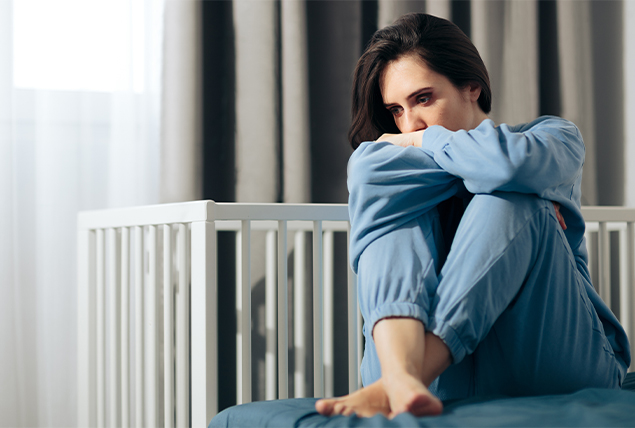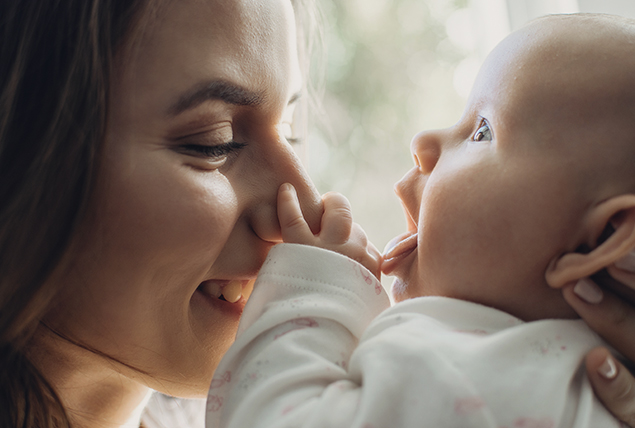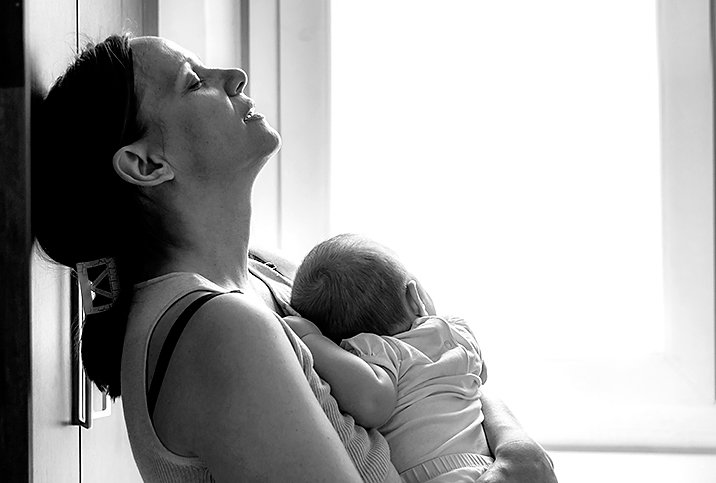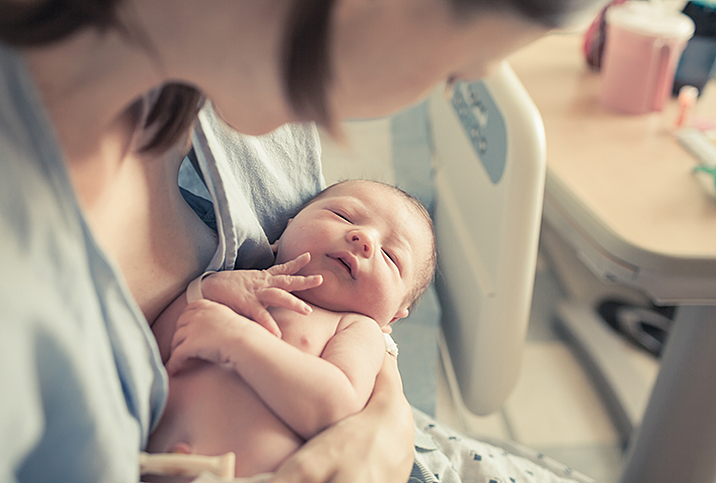What You Need To Know About Postpartum Psychosis

The period after delivering a baby may be accompanied by anxiety, sadness or "the baby blues" as hormonal levels shift. Sometimes, these feelings increase and worsen. Perinatal mood and anxiety disorders are mental illnesses occurring during the postpartum period.
A less common disorder falling under the umbrella of perinatal disorders, postpartum psychosis (PPP), or puerperal psychosis, is considered a mental health emergency because of the risk of harm to the mother or other family members.
What are the symptoms of postpartum psychosis?
Postpartum psychosis impairs a person's sense of reality. It can be hard for someone to differentiate between reality and fantasy. Postpartum psychosis affects just 1 to 2 out of every 1000 deliveries, according to Postpartum Support International.
The symptoms of postpartum psychosis include:
- Hallucinations
- Delusions
- Paranoia
- Mania
- Disorganized speech
- Changes in sleep patterns
- Fast mood changes
- Thoughts of self-harm
- Thoughts of hurting others
Postpartum psychosis often has a sudden onset. It usually occurs a couple of days after giving birth but can begin up to six weeks after delivery, according to information from Cleveland Clinic.
'There can also be an uptick in suicidality and other potentially dangerous subsequent behaviors, as well as mood swings, agitation and irritability.'
Mothers with a family history of bipolar disorder are at a higher risk of developing a disorder like PPP. They are three times more likely to experience a psychiatric disorder after giving birth than women who don't have a history, according to the MGH Center for Women's Mental Health.
Although postpartum psychosis is rare, it can be dangerous. Fortunately, there are signs to look for. These symptoms go beyond the typical baby blues and last longer. Baby blues, for example, begin 2 to 3 days after delivery and typically last for up to two weeks before dissipating, according to the March of Dimes.
Sadness, lack of enjoyment, changes in appetite, energy, concentration, and sleep and suicidal thoughts are common depressive symptoms in postpartum depression, Susan Hatters-Friedman, M.D., from the Group for the Advancement of Psychiatry in Cleveland, said.
What makes postpartum psychosis so dangerous?
"When you think about postpartum psychosis, you tend to jump first to the hallmarks of psychosis—delusional thinking and paranoia, hallucinations, disorganized speech and abnormal behavior, but there can also be an uptick in suicidality and other potentially dangerous subsequent behaviors, as well as mood swings, agitation and irritability," said Kendall Douville, a licensed, certified clinical social worker with Thriveworks in Baltimore.
It's essential to carefully monitor for changes in behavior after birth, Douville said.
"In PPP, the mother presents with symptoms of psychosis—meaning being out of touch with reality, and often also mood swings and confusion," Susan Hatters-Friedman, M.D., a psychiatrist from the Group for the Advancement of Psychiatry in Cleveland, said.
The birthing parent may experience psychotic symptoms, including hallucinations, such as hearing voices or seeing visions, and delusions, which are tightly held false beliefs, Hatters-Friedman said.
Symptoms may develop quickly over days and fluctuate significantly, Hatters-Friedman said. Symptoms can also last for weeks at a time.
Part of the danger of postpartum psychosis is that it puts birthing parents at a heightened risk of suicide and infanticide. It's not a condition to ignore or hope it goes away. PPP requires prompt treatment.
Considering the symptoms mentioned above, "you can imagine how difficult it would be to have all that going on while trying to care for an infant who depends on that mom," Hatters-Friedman said. "This is why PPP is usually considered to be a psychiatric emergency."
Can postpartum depression lead to psychosis?
Another perinatal mood disorder, postpartum depression (PPD), is much more common than postpartum depression, affecting an estimated 1 in 7 birthing mothers.
"PPP is fortunately quite rare, as compared to postpartum depression," Hatters-Friedman said.
A key difference between the two disorders is that there's no standard presentation of postpartum depression, Douville said.
Postpartum depression could present as disengagement, numbness, lack of motivation and sorrow and tears, whereas psychosis generally presents as a state of altered consciousness and is often much more frenetic in nature, Douville said.
In some cases, it's possible for postpartum depression to lead to postpartum psychosis.
What are the risk factors for postpartum psychosis?
"Moms with untreated or severe postpartum depression could develop psychosis—just as people with untreated or severe depression at other points in life could develop psychosis. But that is a different phenomenon, and often a slower development of the psychotic symptoms," Hatters-Friedman said.
"The symptoms of PPP can include mood swings, but the other symptoms of psychosis, like hallucinations or delusions and confusion, are usually prominent as well. To be clear, someone of any age or gender who has depression could develop psychotic symptoms if the depression is severe," Hatters-Friedman said.
Remember that there can be a full recovery from this condition as long as the individual seeks proper psychiatric care.
Risk factors for postpartum psychosis include a personal or family history of a general psychosis-associated disorder like schizophrenia or bipolar disorder, and a history of trauma, Douville said.
First pregnancies may elevate the risk of PPP. The chance of recurrence in future pregnancies increases. If you've had PPP before, you're more at risk of experiencing PPP again.
Even though prior mental illness is a significant risk factor for postpartum psychosis, someone might not have a history of mental illness before developing PPP.
"The very first time that a woman experiences mental health issues may be in an episode of PPP, whether or not she has many of the above risk factors," Hatters-Friedman said.
How do you successfully treat postpartum psychosis?
Postpartum support is important. So, too, is prompt intervention. If your partner or spouse isn't behaving like themselves and the symptoms worsen, don't wait for help.
"Symptoms usually start long after the mom and infant have been discharged from the hospital after delivery—so they happen at home," Hatters-Friedman said. "The risk from postpartum psychosis and the rapidity of its onset are two reasons why it is really important for new moms, their partners and their support to know about PPP."
The behavior changes that accompany PPP are most likely to be noticeable, out of character and severe.
A provider can diagnose postpartum psychosis based on symptoms, a neurological test or a physical exam. "PPP is diagnosed by psychiatrists or health professionals based on the symptoms the mom is presenting with," Hatters-Friedman said.
Lab tests can make sure there is not a physical medical cause for the symptoms, she said.
"Treatment in a hospital is usually initially indicated due to the risks to the mom and the baby. Treatment is with psychiatric medications—often so-called atypical antipsychotic agents with mood-stabilizing medications, as well as therapy. Safety planning for mom and baby is critical," Hatters-Friedman said.
How long treatment takes varies on the person and the type of intervention they receive.
The bottom line
Postpartum psychosis is trying for a birthing parent, family and infant. Receiving treatment is paramount.
"The hopeful thing to remember is that there can be a full recovery from this condition as long as the individual seeks proper psychiatric care," Douville said.
If you or someone close to you has thoughts of self-harm or harming their infant, please head to your local emergency department, or call a crisis hotline or the National Suicide Prevention Lifeline.


















